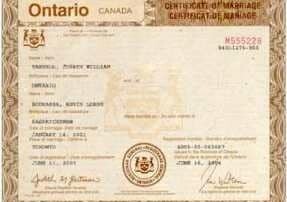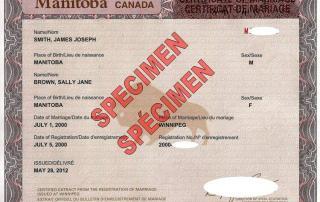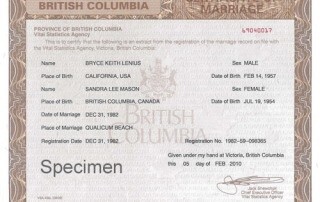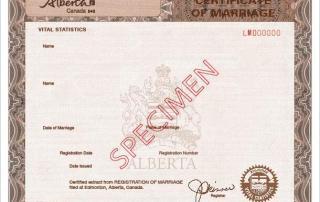Canadian Marriage Certificate Apostille
If you need to use your Canadian Marriage Certificate abroad, the process depends on whether the foreign country is a signatory to the Hague Apostille Convention. As of January 2024, Canada has joined the Hague Apostille Convention, simplifying the process for using a Canadian marriage certificate in countries that are part of this agreement. Here are some key points to keep in mind.
Why You May Need It
Obtaining an apostille or having a Canadian marriage certificate authenticated and legalized can be necessary for several reasons, especially when you're dealing with international affairs. Here are some key reasons why this process might be required:
- International Recognition: Many countries are part of the Hague Apostille Convention, which simplifies the process of recognizing foreign documents. If a Canadian marriage certificate needs to be recognized in a member country, an apostille is essential for its validation.
- Immigration Purposes: If you're planning to move to another country with your spouse, an apostilled or authenticated marriage certificate is often required to prove the legality of your marriage. This is particularly important for residency applications, spousal visas, or other immigration processes.
- Property and Estate Matters: When dealing with property ownership or estate matters in a foreign country, a marriage certificate may be needed to establish your relationship status. An apostilled or authenticated certificate ensures that foreign legal systems recognize your marriage.
- Employment Abroad: Some employers, particularly those in government or international organizations, may require proof of marital status for benefits or legal reasons. An apostilled or authenticated marriage certificate is a universally accepted form of verification.
- Adoption Procedures: If you are planning to adopt a child from another country, you may be required to provide an apostilled or authenticated marriage certificate as part of the application process to prove your marital status.
- Legal Proceedings: In cases of legal disputes or proceedings in a foreign country, such as divorce or inheritance issues, a valid marriage certificate is often required. The apostille or authentication process gives it legal standing in the international arena.
- Education Abroad: If moving for study purposes and accompanied by a spouse, educational institutions or governments may require an apostilled or authenticated marriage certificate for various administrative purposes.
- Banking and Financial Transactions: For opening joint bank accounts or conducting significant financial transactions abroad, a recognized marriage certificate might be necessary to comply with international banking regulations.
- Insurance and Medical Benefits: To receive spousal benefits from international insurance companies or for medical purposes abroad, you may need to present a marriage certificate that has been apostilled or authenticated.
- Cultural or Religious Reasons: In some countries, cultural or religious norms might necessitate the presentation of a valid marriage certificate for various social interactions or ceremonies.
In summary, having a Canadian marriage certificate apostilled or authenticated and legalized is crucial for its international recognition and acceptance. It facilitates a wide range of processes for couples living, working, or interacting in a global context.
Marriage Certificate Apostille Requirements
For countries not part of the Hague Apostille Convention, the process remains unchanged. Before Global Affairs Canada or the Provincial Authority will authenticate your marriage certificate, it must be issued by a provincial government vital statistics office and be an original certificate or long-form type. Global Affairs Canada or the Province's will not authenticate certificates issued at your wedding ceremony or wallet-sized certificates, as they are not acceptable for this process. If you are unsure about the type of certificate you have, our consultations can help you determine the right type.
How to order a Canadian Marriage Certificate for Apostille
Whether you need a new marriage certificate for apostille or authentication and legalization, you can order one from a provincial government vital statistics office. Some clients choose to have the certificate sent directly to our office to expedite the process.
How do I get an Apostille for a Canadian Marriage Certificate?
For countries that are part of the Hague Apostille Convention, only an apostille is needed for your Canadian Marriage Certificate. Since Canada joined this convention in January 2024, obtaining an Apostille Marriage Certificate has become more straightforward. An apostille certifies the authenticity of the document, allowing it to be recognized as valid for its intended purpose in other participating countries.
Choosing the Correct Government Service
The other crucial step is choosing the correct process for the apostille or authentication of your Canadian Marriage Certificate to ensure its validated correctly for international use. This step can be confusing as it depends on what province it was issued in as it could be Global Affairs Canada or one of the designated provincial authorities.
Global Affairs Canada Apostille Services
Global Affairs Canada is responsible for the apostille or authentication of Marriage Certificates issued in specific provinces and territories. It is important to note that Marriage Certificates from these provinces should be processed by Global Affairs Canada, irrespective of their original issuance or notarization location. This includes any Birth Certificate issued or notarized in the following provinces and territories:
- Manitoba
- New Brunswick
- Newfoundland and Labrador
- Northwest Territories
- Nova Scotia
- Nunavut
- Prince Edward Island
- Yukon
Provincial Apostille Services
Certain Provincial Competent Authorities will be responsible for the apostille or authentication of marriage certificates issued in their respective regions. These include Alberta, British Columbia, Ontario, Quebec and Saskatchewan. Although there are exceptions to the rule if the document is a notarized copy or upon other factors which is another great reason to hire a professional service, so you get it right the first time.
Marriage Certificate Authentication and Legalization for Non-Apostille Countries
1
Step 1: Authentication
To ensure your marriage certificate is accepted as a Marriage Certificate Apostille abroad, it is important to have the right type of certificate for the country you are using it in. The first step of the process is authentication by the respective designated authority where it was issued. They will examine the signature on the certificate and authenticate it with the Government's Authentication Stamp if it meets their requirements.
2
Step 2: Legalization
The second step is legalization by the embassy or consulate of the country where you will be using the certificate. Embassy consulates, located in Ottawa, charge a fee for legalization services and may have changing requirements or processing times. When you use our document legalization services, we handle all the details and ensure a smooth and timely process. After legalization, we can return the certificate to you or send it to its final destination using our document shipping options or your preferred method.
How Does Using Global Document Solutions Services Benefit You?
FAQ's
The simple answer is Yes as of January 11, 2024. To make sure the process is done correctly depends on where it was issued.
The countries that will request that you get an Apostille include:
A
- Albania
- Andorra
- Antigua and Barbuda
- Argentina
- Armenia
- Australia
- Austria
- Azerbaijan
B
- Bahamas
- Bahrain
- Barbados
- Belarus
- Belgium
- Belize
- Bolivia
- Bosnia and Herzegovina
- Botswana
- Brazil
- Brunei Darussalam
- Bulgaria
- Burundi
C
- Cabo Verde
- Canada
- Chile
- Colombia
- Cook Islands
- Costa Rica
- Croatia
- Cyprus
- Czech Republic
D
- Denmark
- Dominica
- Dominican Republic
E
- Ecuador
- El Salvador
- Estonia
- Eswatini
F
- Fiji
- Finland
- France
G
- Georgia
- Germany
- Greece
- Grenada
- Guatemala
- Guyana
H
- Honduras
- Hong Kong
- Hungary
I
- Iceland
- India
- Indonesia
- Ireland
- Israel
- Italy
J
- Jamaica
- Japan
K
- Kazakhstan
- Kosovo
- Kyrgyzstan
L
- Latvia
- Lesotho
- Liberia
- Liechtenstein
- Lithuania
- Luxembourg
M
- Macau
- Malawi
- Malta
- Marshall Islands
- Mauritius
- Mexico
- Moldova
- Monaco
- Mongolia
- Montenegro
- Morocco
N
- Namibia
- Netherlands
- New Zealand
- Nicaragua
- Niue
- North Macedonia
- Norway
O
- Oman
P
- Pakistan
- Palau
- Panama
- Paraguay
- Peru
- Philippines
- Poland
- Portugal
R
- Romania
- Russian Federation
S
- Saint Kitts and Nevis
- Saint Lucia
- Saint Vincent and the Grenadines
- Samoa
- San Marino
- São Tomé and Principe
- Serbia
- Seychelles
- Singapore
- Slovakia
- Slovenia
- South Africa
- South Korea (Republic of Korea)
- Spain
- Suriname
- Sweden
- Switzerland
T
- Tajikistan
- Tonga
- Trinidad and Tobago
- Tunisia
- Turkey
U
- Ukraine
- United Kingdom
- United States of America
- Uruguay
- Uzbekistan
V
- Vanuatu
- Venezuela
List of Countries you will need to use the Authentication and Legalization Process for a Canadian Document
For your reference, we have provided a list of countries that have not ratified the Apostille Convention. It is your responsibility to verify the accuracy of this information.
- Afghanistan
- Algeria
- Angola
- Bangladesh
- Benin
- Bhutan
- Burkina Faso
- Cambodia
- Cameroon
- Central African Republic
- Chad
- Comoros
- Congo
- Côte d'Ivoire
- Cuba
- Democratic People's Republic of Korea
- Democratic Republic of the Congo
- Djibouti
- Egypt
- Equatorial Guinea
- Eritrea
- Ethiopia
- Gabon
- Gambia
- Ghana
- Guinea
- Guinea-Bissau
- Haiti
- Iran
- Iraq
- Jordan
- Kenya
- Kiribati
- Kuwait
- Lao
- Lebanon
- Libya
- Madagascar
- Malaysia
- Maldives
- Mali
- Mauritania
- Micronesia
- Mozambique
- Myanmar
- Nauru
- Nepal
- Niger
- Nigeria
- Papua New Guinea
- Qatar
- Rwanda*
- Sierra Leone
- Solomon Islands
- Somalia
- South Sudan
- Sri Lanka
- Sudan
- Syria
- Thailand
- Timor-Leste
- Togo
- Turkmenistan
- Tuvalu
- Uganda
- United Arab Emirates
- Tanzania
- Viet Nam
- Yemen
- Zambia
- Zimbabwe
* The Apostille Convention will come into effect in Rwanda on June 5, 2024.
As Canada's leading authorities, Global Document Solutions is equipped to expedite the preparation of a Canadian Death Certificate for global use, leveraging our 30 years of experience and current knowledge of Global Affairs Canada and Embassy regulations. Global Document Solutions service extends beyond swift document processing; we strive to simplify the procedure by guiding you through each stage, providing real-time updates on your document's status through our Online Status Tracker. Consult with one of our experts on international acceptance of the Death Certificate and leverage our expertise for your benefit.
No, as per the rules and regulations, only an original Death Certificate issued by a Canadian Provincial Vital Statistics Department can be authenticated. A notarized or certified copy made by a Canadian Notary Public cannot be apostilled or authenticated.
There are two different styles of Canadian Death Certificates such as the certificate size or the long form certified copy of the registration of death. Both come as certified true originals from the provincial Vital Statistics department. It's important to remember that the one you got from the Funeral Director or Funeral Home is not an official death certificate. The provincial statistics department of the province where the death took place issues the official death certificate. If you need to order a Death Certificate you can find links on our resources page on how to do it.
A Canadian Death Certificate is initially only valid for use in Canada therefore a foreign country will not accept a Canadian Death Certificate. To make the Death Certificate valid for use in a foreign country, it will first need to go through either the process of Apostille or Authentication and then if authenticated it needs Legalization at the Embassy Consulate of the country in which the document will be used. In both cases the authenticity of the foregoing signature is verified, effectively making the document valid for use in that foreign country. Some countries might ask you to get the Death Certificate Apostilled since that is the process most used in that foreign country. Since Canada has signed the Hague Apostille Convention, we now issue Apostille Certificates for use in member countries.
Most Vital Statistics Departments have an option to have the Death Certificate sent directly to a third party such as Global Document Solutions. Once you have been in contact with one of our agents regarding your request and confirmed how you want to proceed, we will provide you with our mailing address where the Death Certificate can be sent. A few Vital Statistics Departments, such as the Quebec État Civil, do not allow the Death Certificate to be sent directly to a third party. In this case the Death Certificate will need to be delivered to you first, then you can send it to us for Apostille or Authentication and Legalization.
If you have never ordered a Canadian Death Certificate, you have misplaced or lost the Death Certificate, the original you have is damaged, you can order a new or a replacement Death Certificate from the Provincial Vital Statistics Department in the province where the death took place. You can find links to the various vital statistics departments on our document resources page.





